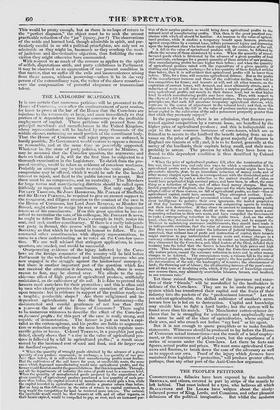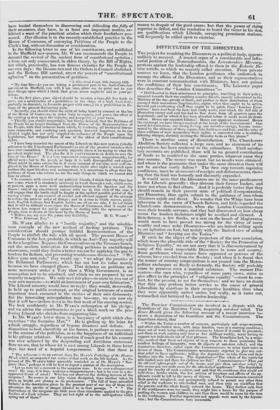THE PEOPLE'S PETITIONS.
CONSTITUTIONAL fallacies have been exposed by the merciless liaamsam, and others, covered in part by strips of the mantle he left behind. That must indeed be a tyro, who believes all which BLACKSTONE and DE LOLME have written about the nicely- balanced power of King, Lords, and Commons, and other pleasant delusions of the political imagination. But whilst the moderns
have busied themselves in discovering and ridiculing the folly of their ancestors, they have, in at least one important matter, ex- hibited a want of the practical wisdom which their forefathers pos- sessed. .Our allusion is to the recently-established practice in the House of Commons, of conveying Petitions of the People to the Clerk's bag, without discussion or consideration.
In the following letter to one of his constituents, and published in the Sheffield newspapers, Mr. WARD recommends the People to demand the revival of the ancient form of constitutional agitation ; a form not only consecrated, in olden theory, by the Bill of Rights, but which, practically, has won famous victories for the People in our own days : the Income-tax and the Orders in Council abolished, and the Reform Bill carried, attest the powers of "constitutional agitation " on the presentation of' petitions.
" 2, Cleveland Court, 10th Januery 1839. " My dear Sir—As you are taking a prominent part in the Anti-Corn-law movement in Sheffield, you will, I am sure, allow me to point out to you dove thiogs, upon which I think that great stress ought to laid in your pe- titions.
Ilk the first place, your object should be to carry a bona fide free trade in corn ; not a substitution of a prohibition hi the shape of' a high fixed duty, gradually to diminish, (a favourite project with some,) for a prohibition in the shape of the present fluctuating scale.
" Secondly, you should claim the right of being heard by counsel at the bar of the House of Commons, in order bay to explain, and prove, the effect of the existing system upon the industry and prosperity of your town.
" Thirdly, you should respectfully: but firmly, demand, that the Petitions of the People be no longer dismissed from the Rouse of the Representatives of the People, with that indecent haste which, by rendering all incidental discus- sions impossible, and confining each question, however important, to its one ellotted night, has not only crippled the influence of the People upon the Legislature, but stripped them ot one of the oldest of their constitutional rights. " I have long regarded the assent of the Liberals to this new system (wholly unknown to the Unrefbrmed Parliament) us one of the greatest mistakes they have ever committed. With a hostile majority there is no saying to what the precedent might lead. The plea for it is CONVENIENCE—a desire to save the time of the "louse ! It is a very convenient arrangement, unquestionably, for official men ; but to the people at large it is both disrespectful and unjust. There might be some excuse for it, if every moment of our time were well em- ployed in the House of Commons ; hut when night after night is wasted upon waiters the most frivolous and unimportant, it is monstrous to allege that the petitions of those who return us, are the only things to which we cannot find time to attend.
" In common with several of my political friends, I think that the time has
now come, when it is absolutely necessary to break through a rule, which rests, at present, upon a mere tacit understanding between the Speaker and the house: and, if my constituents concur with me in this view of the case, I will engage that the battle shall be fought at the earliest possible period of the coining session. I am assured of cordial and efficient support in the attempt to restore the ancient order of things ; and in a case in which reason, prece- dent, English feelings, tiul English 'habits, are all on one side, I do not think that it will be difficult to convince the House of Commons that it ought not to show less respect for public opinion in dealing with the opinions of the People, than is shown at this hour by the House oi Lords. " Believe me, my dear Sir, yours very frithfully, H. G. WARD."
" Win. Ibbotson, Esq."
Mr. Winn alludes to a " hostile majority," and the mischie- vous example of the new method of Lurking petitions. This consideration should prompt faithful Representatives of the People to abolish the rule with all speed. The present louse of Commons is:the last., probably, in which an Anti-Tory majority will sit for a long time. Suppose the Conservatives on the Treasury bench, and the Modern innovation fir stifling petitions in unchallenged observance, could they desire a better excuse for applying the gag to bawlers f 'or Reform, mid preventing troublesome discussion ? " We follow your own rule," they would say : "we adopt the practice of the Reformed Parliament ; which has not lost its value merely because we have changed places. That debates on petitions are more necessary under a Tory than a Whig Government, is an assumption not to be admitted, and which we are prepared by our majority to negative. We only seek fair play—to mete to you out of your own measure—to wield an instrument of your own fabrication." The Liberal minority would have no reply: they would, deservedly, be held up to public contempt, as the original betrayers of a most important trust, ensnared in the meshes of their own dishonesty. But the innovating inisregulation may be—nay, we can now say that it will be—broken down in the first week of the ensuing session. We look confidently to Mr. WARD'S redemption of his pledge ; and we advise the constituencies to put a black mark on the pro- fessing Liberal who shrinks from supporting him. In 'Mr. WARD'S letter there is a buoyancy of spirit which cha- racterizes "the Sanguine Man."* He is girding up his loins for a fresh struggle, regardless of bygone disasters and defeats. A disposition to look cheerfully at the future, is perhaps as necessary to the success of the politician, as to the happiness of an individual in his private relations. We question if much good for his country was ever achieved by the desponding and fastidious statesman. Sure we are, that he whose lot is cast among Liberals in these latter days has need of a hopeful temperament. Not that there is * The reference is to an extract from Dr. Ms.vo's Patholoqy of the Human Mid, which accompanied our notice of that work on the 5th instant. As the perusal of Mr. Wsan's letter agreeably reminded us of Dr. MAYO'S " San- guine Man," perhaps it will be best to repeat a portion of the description. "Let us turn ffir a moment to the sanguine man. Is he ever a disappointed nun? Ile may, it is true, undergo a disappointment ; but is he ever in a appointed frame of mind ? Who has not observed the shifting horizon of the sanguine? No sooner is one fairy vision dissipated, than another takes its place, as bright and gleamy as its predecessor. The full of hope, miscalled forlorn,' is the description given by the greatest poet of oar day of those who adventure the service of danger alluded to in that passage. * * * The frustratiens of the sanguine are little more than stimulants applied to the pro- duction of a fresh scheme. They are lost Sight of in the anticipations which spring. Out of thefts."
reason to despair of the good cause; but that the power of rising superior to defeat, and the resolution to beard the victor in his den, are qualifications which Liberals, occupying prominent stations, will frequently be called upon to exercise.



























 Previous page
Previous page